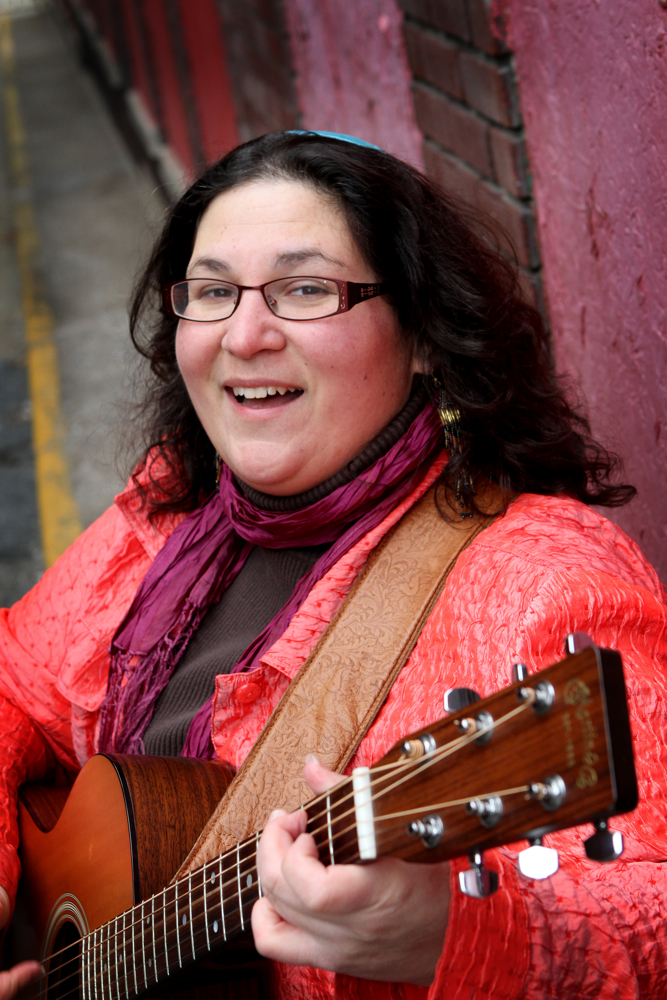I loved the cover of my first album. It was all swirls of red and blue painted by my friend Eileen. The year was 1996, and I was proudly selling my CDs (and cassette tapes!) after finishing a performance. One woman bought a CD, took one look at it, shook her head, and said, “Your next album needs to have your picture on it; the world is ready.”
She was a fat woman –as am I– and we were both attending a Fat Women’s Gathering. In my late teens and early 20s, such gatherings were a vital part of my coming out as a woman who enjoys living in my body no matter its size and takes non-dieting approaches to health and well-being. At the gathering, there were workshops on fitness, and sexuality, and the intersections between fat politics and other social justice issues (racism, ableism, and the like). But there was also time simply to be together in a context where we could be our own playful, smart—and outraged– fat selves in a safe space (almost always with a pool for frolicking).
I am reminded of this woman and her insistence that “the world is ready” when I read the story of the daughters of Tzelophechad. In Parashat Pinchas, Tzelophechad’s daughters approach Moses with their concern that because their father left no sons, his familial allotment in the Land of Canaan will be lost. They argue that they should be allowed to inherit his land. Moses takes their case to God, who replies: “The daughters of Tzelophehad speak right: thou shalt surely give them a possession of an inheritance among their father’s brethren” (Numbers 27:7).
What seems to bother Rashi (and the earlier commentators he draws upon) is this: With all the other clearly outlined laws about how to create a just and holy society, how could Moses not have known that this was the right thing to do!?! Rashi’s answer is that when God says that the daughters of Tzelophechad are correct, what God means is, “Yes, this is how this passage [about inheritance laws] is written before Me on high [i.e. in My version of My Torah]. Rashi continues, “This teaches us that their eyes saw what Moses’ eye did not.”
These sisters saw a Torah, saw a truth about what was just, that no one–not even Moses–had seen before, and declared that now the world was ready for it. They used their own experience of facing the loss of their father’s portion — just because they were daughters and not sons — and empowered one another to stake their claim to an inheritance among their people.
In Dirshuni: Israeli Women Writing Midrash, Rivka Lovitz notices that Tzelophechad’s daughters are first referred to as “daughters of Tzelophechad” (Numbers 27:1), and then at the end of the verse they are each mentioned by name (“Mahlah, Noa, and Hoglah, and Milcah, and Tirzah”). Lovitz reads their father’s name as composed of two words, interpreting it this way: At first, they were filled with shadow (tzel) and fear (pachad). It was only when they stood together that they were able to come out from the shadow of fear, be called by their own names and speak their truth.
My “sister” at the Fat Women’s Gathering was inviting me to do the same. She was inviting me to let go of any vestiges of my own shame about my body and be willing to be seen. Having my picture on my album wouldn’t discourage people who already liked my music from buying it. Nor had keeping my picture off of my first album done anything to protect me from (what we now call) fat-shaming, or from the discrimination in healthcare, education, and employment that fat people regularly face.
Like Milcah, for whom I am named, I became able to engage in the (always ongoing) process of emerging from the shadow of fear, by standing with other fat women (and body-positive people of all sizes and genders) and speaking our Torah, our truth. In doing so, I hope to continue to be blessed to help others claim their rightful inheritance of human dignity.
My second album? It’s got my picture on the cover–and it’s called “The World is Ready.”
Minna Bromberg is a singer, songwriter, and rabbi who uses the tools of singing, songwriting, and Torah to help individuals and communities bring more of their inherent wholeness to the world. She lives in Israel, where she coordinates the Year in Israel Program for Hebrew College rabbinical students. Learn more about her work at minnabromberg.com or songsofsoothing.com.
Want to receive Torah from T’ruah in your inbox every week? Sign up here!

